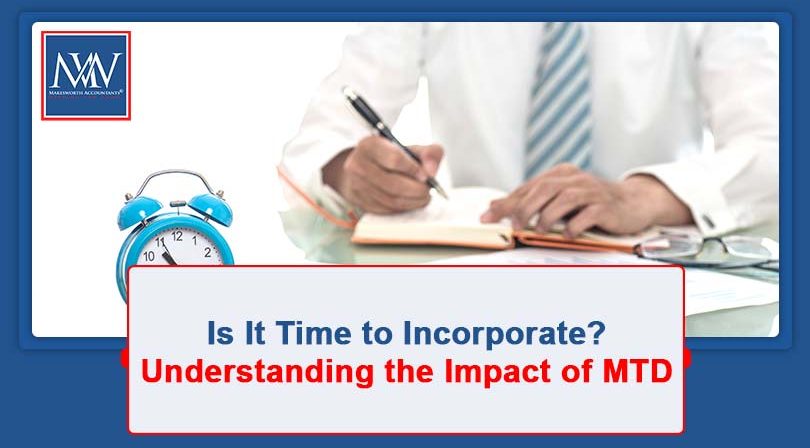
Is It Time to Incorporate? Understanding the Impact of MTD
The Shift is Here: MTD for Income Tax Confirmed
After several years of delay, the launch of Making Tax Digital (MTD) for Income Tax is finally happening. This new phase will significantly change how millions of self-employed individuals and landlords report their income to HMRC. As announced in the Autumn Budget 2024, by the end of this Parliament, all self-employed individuals and landlords earning over £20,000 annually will be required to comply with MTD rules.
Interestingly, there is still no confirmed timeline for when companies will be brought under the MTD umbrella. The government intends to introduce MTD for Corporation Tax, but only after the rollout for Income Tax is fully operational. This uncertainty has raised a timely question: Could incorporation be a strategic move to delay MTD obligations?
What Will Change Under MTD?
Under the MTD regime, traditional annual tax returns will be replaced with a more dynamic and frequent reporting system. Taxpayers will be required to:
- Maintain digital records of transactions.
- Submit quarterly updates using MTD-compatible software.
- File a “final declaration” by the following 31 January, summarizing the quarterly updates and reporting any additional taxable income such as employment or investment income.
This new system increases the overall compliance burden and, potentially, the cost for self-assessment taxpayers.
Is Incorporation Still a Smart Tax Move?
In the past, incorporation was often recommended for its tax advantages. However, those benefits have steadily eroded. Recent calculations suggest that from a purely tax-saving perspective, incorporation may no longer offer significant advantages, regardless of business profit levels.
That said, the decision to incorporate shouldn’t be based solely on tax outcomes. Factors such as limiting personal liability, enhancing business credibility, and strategic growth considerations may still make incorporation worthwhile.
Comparing Compliance Burdens
MTD introduces more frequent reporting for the self-employed, increasing administrative overhead. While companies are currently subject to complex reporting rules, their submissions are typically less frequent. Corporate obligations include:
- Running a payroll system.
- Paying monthly or quarterly employer NICs.
- Filing annual accounts and returns with both Companies House and HMRC.
These obligations can be demanding and time-sensitive, potentially offsetting any minor tax savings.
Penalties: A Stricter Regime Under MTD
Under the MTD framework, individuals who fail to submit quarterly updates on time will face penalties. These fines will apply to each missed submission. Additionally, because HMRC will receive more frequent updates, discrepancies are more likely to be identified earlier, leading to increased scrutiny or even investigations.
Companies also face penalties for late submissions, but since their reporting remains annual for now, there is less immediate pressure compared to the quarterly cadence required under MTD.
The Cost Factor: Is It Worth It?
While incorporating a company only costs £50 initially and £34 annually to file a confirmation statement, there are hidden costs. Running a company involves software subscriptions, professional fees, and the administrative effort of keeping up with ongoing filing duties.
Likewise, self-employed individuals currently avoid some of these costs but will soon need to invest in commercial MTD software for compliance—an additional expense they haven’t had to consider until now.
Transparency on the Horizon
A practical point to consider: The Economic Crime and Corporate Transparency Act, currently moving through Parliament, will require all small companies, including micro-entities, to publish their profit and loss accounts. This increased transparency may be a deterrent for those considering incorporation simply to avoid MTD for Income Tax.
Final Thoughts
MTD for Income Tax is coming, and it’s changing the game for millions of taxpayers. Incorporation is no longer the obvious choice for tax savings, and the new rules bring fresh costs and compliance challenges. Whether you stick with self-employment or consider forming a company, it’s crucial to weigh both the financial and administrative implications.
Additional Resources:
- Agent Update Issue 128
- Agent Toolkit: Get ready for Making Tax Digital for Income Tax
For more information, Book a Free Consultation
Need Accountancy Support?
For information on bespoke training, or if you have any other questions for Makesworth Accountant, please fill in your details below
















 151
151